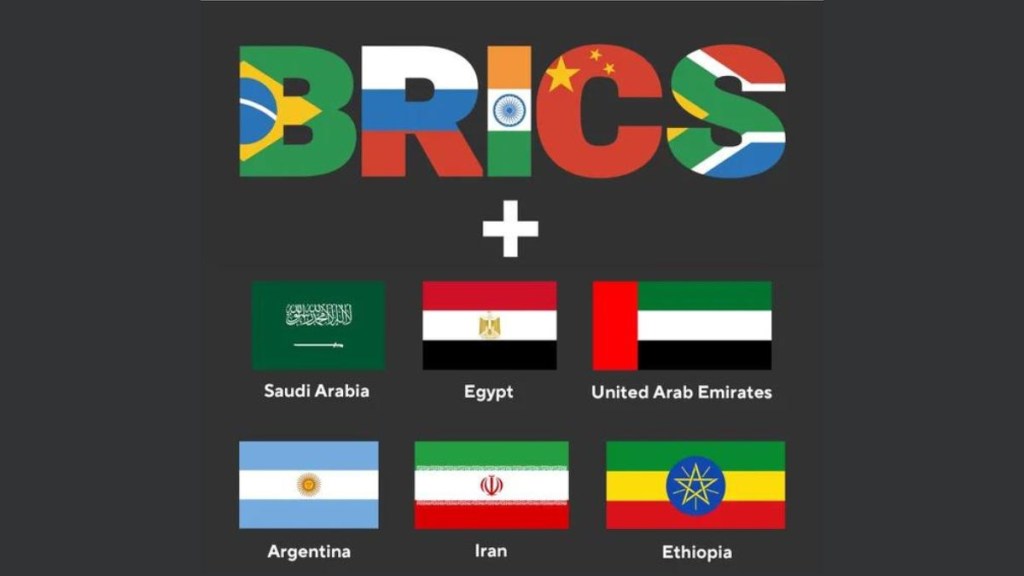The BRICS bloc — Brazil, Russia, India, China, and South Africa, is set to undergo a significant transformation with the addition of Saudi Arabia, the United Arab Emirates (UAE), and Iran. This strategic expansion not only bolsters the bloc’s control over a substantial portion of the world’s oil production but also propels its GDP growth to a staggering 30 percent of the global economy, surpassing an impressive US$30 trillion.
New Global Dominance in Oil Production
The inclusion of Saudi Arabia, the UAE, and Iran within BRICS brings forth a momentous shift in the world’s oil landscape. With these powerhouse nations as part of the alliance, the collective control over global oil production will soar, reaching a remarkable 80 percent. This consolidation of oil influence marks a significant stride towards reshaping energy dynamics and bolstering the economic might of BRICS.
Unprecedented GDP Growth
Beyond oil, the expanded BRICS bloc is poised to make an indelible mark on the global economy. The combined GDP growth of the new member countries is projected to stand at an impressive 30 percent of the world’s GDP. This mammoth figure, exceeding $30 trillion, not only underscores the economic prowess of the alliance but also positions it as a formidable player on the international stage.
Guiding Principles and Expansion Announcement
President Ramaphosa, in his announcement of the Johannesburg II Declaration and the XV Summit, unveiled the guiding principles underlying the expansion of BRICS. The first phase of this expansion brings Argentina, Egypt, Ethiopia, Iran, Saudi Arabia, and the UAE into the fold. Their formal membership will take effect from January 1, 2024. This expansion signals the bloc’s commitment to greater cohesion and collective growth.
Unity and Stronger Forum
Prime Minister Narendra Modi, reflecting on the expansion decision during the 15th anniversary of BRICS, emphasized that the new additions would fortify the alliance and enhance its effectiveness. India’s unwavering support for this expansion underscores the broader sentiment that a stronger BRICS will pave the way for more impactful global engagements. As the family of BRICS welcomes these nations, it signifies a collaborative step towards shared progress and influence.
Global Geopolitical Implications
Md. Muddassir Quamar, Associate Professor at the School of International Studies, Jawaharlal Nehru University, provides a nuanced perspective on the expansion’s significance. He notes that the global geopolitical landscape is evolving with the emergence of a US-led established international order and a China-led challenge to the existing financial systems. The BRICS expansion, with a focus on alternative financial mechanisms, holds the potential to counterbalance these dynamics and offer a platform for developing nations to assert their influence.
Addressing Anomalies and Challenges
According to Prof Quamar, the expansion rectifies a longstanding anomaly within BRICS – the absence of representation from the Middle East and North Africa (MENA) region. By admitting Egypt, Iran, Saudi Arabia, and the UAE, in addition to Argentina and Ethiopia, BRICS takes a substantial step towards inclusivity and equitable representation. However, the move is not without challenges. Achieving consensus among diverse member countries and developing systematic capabilities remain pivotal hurdles to overcome.
Global Geopolitical Landscape and Future ProspectsIn his opinion, while the expansion fosters unity and progress within BRICS, it may also lead to heightened global geopolitical competition. The tussle between the US-led established international order and the emerging China-led aspirational international order could intensify as these alliances seek to assert their dominance. As BRICS expands and evolves, its role in shaping global financial and economic norms gains prominence, raising questions about its ability to rival established bodies like the G7.
The forthcoming expansion of BRICS heralds a new chapter in its history, one defined by increased oil production influence and unprecedented economic growth.

